|
Several weeks ago, I stood in line for what I thought would be a “normal” Confession. The line was long, which was good because I needed time to get my thoughts in order. I had not been to Confession for some time and my prayer routine had been... anything but routine. The busy-ness of life had gotten in the way. Moving to a new city, buying a new house, starting a new job, raising a young daughter, and anxiously awaiting another baby on the way were just some of the things that had been preoccupying my mind and time. I felt guilty for “ignoring” God, like many other parents who attempt to balance work and family life while trying to manage their spiritual lives as well. As I moved closer to the Confessional, I became very aware of a familiar guilt creeping into my soul. Memories of un-Christian actions and inactions that have made lasting impacts on my life hit me in mental waves. These are things that I’ve taken to the Confessional before, but I still felt their burden of shame in my mind and heart. I tried to rouse my theological senses to rationalize my worry away, “There is no unforgivable sin.” I tried to encourage myself. Did I really think that my sinfulness was greater than the Divine Goodness? I became uncharacteristically racked with doubt as I neared the Confessional. Only a few people stood between me and the Confessional door, and I took this chance to look at the tabernacle. “Lord, can You really do this? Can You forgive me, even when I can’t forget what I've done? Even when I can’t forgive myself?” I was surprised at the depth of my anguish. I decided to bring this up to the priest in my Confession, and I eagerly anticipated hearing some good counsel. After I made my Confession, the priest took a deep breath and remained silent for a time. I was convinced for a moment that I had overburdened him, that I had shocked him with my doubts. After a few moments he said, “For your penance, spend a few minutes in front of the Blessed Sacrament. Let Jesus talk to you.” I’ll admit, initially I was a bit downcast. I was hoping for some advice! Something that I could do to help myself. I have prayed in front of the Blessed Sacrament many times, and I’ve had more mundane experiences than life-changing ones. Slightly disappointed, I made my Act of Contrition and walked off to the Blessed Sacrament chapel. I knelt and fixed my eyes on the tabernacle. I repeated the question I had asked earlier, “Lord, can you really forgive me?” And then very clearly, very abruptly, and in a voice not my own, I heard: “Do you think I’m a liar?” God spoke. His question was presented in a challenging way, but not an aggressive way. It was presented in a way that gave me space to respond with an answer, a true answer. In God’s loving mercy, He knew how to speak to me so that I would understand that He had forgiven me. He responded to my question with His own question, as a good Rabbi would. The Lord shattered my racing, scrupulous thoughts, and he dared me to call Him a liar, just to get my attention. All in the presence of his sacred Body. I had to stifle laughter as I knelt in the chapel with the other penitents. I was amazed! His simple question had infused my soul with joy and comfort because I know and believe that God is not a liar. How could I kneel before the Eucharist, gaze upon His sacramental Body, and call him a liar? God is Truth, there is nothing false in Him. And He does what He says He will do. I gazed at the Eucharistic Body of our Lord and was full of gratitude and awe. The God of the Universe had made Himself present through bread so that I might know His Love. A week ago, the Church commemorated Blessed Carlo Acutis, a young man who was filled with Eucharistic awe and who knew that it is the act of gazing upon the Eucharistic Body of Jesus—not looking at ourselves—that changes hearts. I think one of his wiser quotes sums up this thought, “Sadness is looking at ourselves. Happiness is looking toward God.” God used the Eucharist, the sacrament of Love, to remind me that I was living incurvatus in se--turned in on myself—which was preventing me from seeing that I was freed from my sins, that I could live anew. Confession and Eucharist together brought me great spiritual consolation that day. As the Church in the United States dedicates more time and energy to catechesis on the Eucharist, and as we celebrated Carlo Acutis’s life last week, I hope that we can find time to gaze upon God in the Eucharist and to come away awestruck by the great, sacrificial Love residing in the Blessed Sacrament.
0 Comments
One of the things I love about Catholicism is that we celebrate the mysteries of our faith in a physical way. Going to Mass, kneeling, standing, singing, receiving the Eucharist, hearing and proclaiming the Word of God, experiencing community after Mass or at parish events. Some of our liturgical feast days even emphasize the physical contact between us and the Divine. Think of reverencing the wood of the Cross on Good Friday or participating in a Eucharistic procession on Corpus Christi. Our faith is incarnational, and our bodies are important conduits for worship. That’s part of the reason the last several months have been so difficult for so many. These physical elements of worship have been—largely—unavailable to us because of COVID-19 and the practice of physical and social distancing. Most of us have also been physically disconnected from our communities of faith, friends, and family. We’ve missed important events like birthdays, retirement parties, and even funerals. The emotional, spiritual, and psychological effects of this separation are very real and very serious. And it’s been clear from the outset of this pandemic that the Church must take action to alleviate the impact of isolation, despair, and loneliness caused by this pandemic. But who will lead the charge? I find myself asking, what is the Church going to do about it? How will we get through this? And then I realize, the Spirit is calling me. And, friends, the Spirit is calling you too. We’re not being called to wait around while someone else figures it out. God is calling us to figure this out together. We must remember that we are the Church on earth, and we are being invited by the Spirit to cooperate with God’s grace to take action and serve others, right now. We can’t simply wait for someone else to help. Those of us who are baptized are called to be missionary disciples and, ultimately, saints. And this call comes with a personal responsibility to recognize that all our lives are interwoven as branches grafted onto the Vine, as various parts of one Body (1 Corinthians 12). We are connected to one another through our baptism into Christ. Paul says, “The body is not a single part, but many.” And because of this interconnectedness, when one part suffers, the whole body suffers. So, we’ve got to do something about that, because we’re called to be “doers”. We are all suffering in some way during this pandemic. It’s not even possible to downplay that. And we all feel one another’s burdens. We especially feel our personal stresses and anxieties, day in and day out. I believe one of the answers to this anxiety and suffering is the beautiful work of spiritual accompaniment. The call to spiritual accompaniment is incarnational and based on the love of Christ. Spiritual accompaniment urges us out of our own interior world and presses us to walk with our brother or sister in whatever situation they might find themselves. Pope Benedict XVI says that God’s love for humanity is so strong that “it turns God against himself, his love against his justice” (Deus Caritas Est, 10). How, then, can we demonstrate a reflection of this great, personal love to one another if we can’t be physically present to one another? I believe we must be creative and find ways to communicate our companionship to one another in meaningful ways. We can allow ourselves to be challenged by these questions while we reflect on this topic: Do I have the ability to be present to my suffering neighbor in any way today? Do I have the capacity to do charitable spiritual accompaniment during this pandemic? I believe one effective way to spiritually accompany others as we remain physically distant is to ask challenging questions of others and engage in honest conversation. Though this may seem simple, “faith sharing” is a powerful way to be witnesses of God’s presence, and we all need to be reminded of God’s presence these days. I think there are two simple, penetrating questions that can start fantastic spiritual conversations that open our eyes to the great works of God. They are:
The answers to both of these questions reveal our hearts, our spiritual yearnings, our joys, and our sorrows; the answers to both of these questions lead us to recognize God’s presence among us, either by contemplating where we’ve seen God or petitioning His aid through prayer. I want to challenge you to invite a friend or someone you’re close with to consider these questions and then to hear their answers. Perhaps you’ll be surprised at the way the Spirit guides the conversation. I believe that through this simple practice of spiritual accompaniment, we will grow closer with one another, though distance or politics or ideologies may keep us apart. Loving and holy conversation is one way to begin healing the wounds caused over these last several months, and it is one way to accompany one another on the road as we travel strange, new paths together. To learn more about spiritual accompaniment, please click here. For more resources to deepen your faith during COVID-19, please click here.
When I was a senior in high school in the diocese of Joliet, then-Bishop Peter Sartain came to celebrate one of our monthly school Masses. I was asked to assist the Bishop for the day, and throughout the day he and I had many warm conversations. I received a piece of mail a few weeks later from Bishop (now Archbishop) Sartain containing a handwritten note and several prayer cards with Blessed Pier Giorgio Frassati’s image on them. Little did I know that the young Blessed would soon become one of my dear patron saints. In my opinion, anyone who offers their life as an apostle on mission—including lay and ordained ministers, Catholic school employees, catechists, and all spiritual guides—should keep Blessed Pier Giorgio Frassati as their patron saint and their example to combat despair and to joyfully share the Gospel. Blessed Pier Giorgio shows us the Christ-like demeanor and personality that the Church and her ministers and missionaries should possess as they evangelize the world. Blessed Pier Giorgio makes an excellent spiritual guide and mentor because he was an ordinary young man with a profound commitment to the poor and to justice. There are countless books and articles that describe how Pier Giorgio spent hours serving the poor and the homeless, often giving away the money he had for bus fare and even his own jacket! His parents misunderstood his great actions of charity, and often scolded him when he returned home late without his coat. He was never distracted from the missionary imperative of the Gospel. Instead, he served those on the margins as Jesus commanded. Archbishop Wilton Gregory of Washington D.C. recently stated in a webinar, “The Church lives in society. The Church does not live behind the four [walls] of the structures where we worship.” Just as Pier Giorgio Frassati befriended the poor and sought justice as a “man of the beatitudes,” we too must go beyond the four walls of our churches, homes, and offices into the margins of our society to serve our brothers and sisters and work for justice. Blessed Pier Giorgio also accompanied others in their pursuit of God. He maintained unlikely friendships and was neither bound up by cynicism nor weighed down by scandal. Instead, he actively worked against these in his interactions with all. Many stories detail his love for pranks, making bets with his friends over games and making the stakes be attending Mass or Adoration. Like this soon-to-be-saint, we must live in the world while encouraging others to return to Christ in the spirit of friendship. As apostles on mission, we must live, work, and play with a renewed spiritual vision, driven by the practice of spiritual accompaniment. The quality I most admire in Blessed Pier Giorgio is his ultimate trust in God’s plans. He did not try to take control of his life’s plan nor did he envy God’s authority. Rather, he allowed God to guide him as he discerned his future and his mission in life. Pier Giorgio brought Church doctrine to life through his service and actions. He lived with a gospel-inspired freedom. He spent time in deep prayer, contemplating the mission God had laid before him, discerning to serve the poor as a lay man with expertise in mechanical engineering rather than as a priest. Pier Giorgio trusted God. As Alfonso Nebreda, S.J. wrote, “We must not forget that man cannot nourish his spirituality with orthodoxy alone … there is more to Christianity than this … for faith is life” (Kerygma in Crisis?, Nebreda). Blessed Pier Giorgio embodied the Gospel, and he lived it out according to his mission from God. As we consider the life of Blessed Pier Giorgio Frassati, I invite those who serve the Church as lay or ordained ministers, catechists, educators, and spiritual guides to adopt this young saint as a guide for our spiritual lives and our ecclesial missions. Let us invite the same Spirit who lived in Blessed Pier Giorgio and who makes the Church vibrant to renew our hearts, minds, and missionary efforts. Blessed Pier Giorgio, pray for us! Interested in learning more about becoming an apostle on mission? Click here to learn more. If you’re used to communicating with others via text message, then you’ve probably, at some point, received a message and interpreted it out of context. A curt reply with a period at the end could be misinterpreted as either passive aggressive or as an irritated response. This happens to me occasionally, and I always have to remember that without hearing a person’s message verbally, it can be difficult to understand what they’re really saying or implying. Maya Angelou’s quote rings true here: “Words mean more than what is set down on paper. It takes the human voice to infuse them with deeper meaning.” Our voices add a unique depth and fullness to our communications by revealing emotions, nuances, and subtle meanings more sharply than words alone can communicate. On this feast of the Nativity of St. John the Baptist, I am struck by St. Augustine’s words from this morning's Office of Readings: “Today we remember that Zechariah’s ‘tongue is loosed because a voice is born.’” St. John the Baptist was born to be the final prophetic voice who proclaimed the Word made flesh. Like the Old Testament prophets, John foretells the coming of the Messiah and calls sinners to repentance with words that cut to the heart (Luke 3:1-29). But, unlike the Old Testament prophets, John identifies the Messiah for the first time in salvation history. John points Jesus out and encourages his followers to pursue him (John 1:29-37). He is confident that his cousin is the foretold Christ, and by his proclamation John fulfills the mission of all the prophets as he straddles the boundary of the Old and New Testament. John’s historical mission of giving voice to the Word is also our mission. At our baptism, we were anointed as a priest, prophet, and king. We share uniquely in Jesus’s ministry, and we are called to be lay prophets who proclaim the good news of repentance and redemption. We must, like John the Baptist, spend time coming to know the promises of the Messiah so that we can recognize Him when we see him. And when we see Him present in the sacraments, or when we encounter Him as we are accompanied by a spiritual mentor, or when we experience Him through the fullness of our prayer, we must point Him out for all to see. To fulfill our baptismal call to be prophets of the Gospel of Christ, we must give voice to our experiences of God. John’s words must be our words to the world, “Behold, the Lamb of God.” My wife and I welcomed our first daughter into the world on February 24th, and we brought her home a few days later on Ash Wednesday. As is the typical newborn parent experience, we’ve endured frustrating, sleepless nights and reveled in joy-filled, playful mornings. Because of stay-at-home, work-from-home orders in Texas, my parental leave has been longer than I anticipated, but I believe this is a blessing. Each moment I’ve had with my daughter has been precious, and as I sit on this (squeaky!) rocking chair holding her in my arms, balancing my laptop on my knee, the recent advice of expert parents runs through my mind and evokes in my heart a fresh understanding of God’s divine fatherhood and my pursuit of sainthood. In the weeks leading up to our daughter’s birth, one mother of 6 said something to me to the effect of: “The nights are long and the days are short, but the years are the fastest of all.” In these first few weeks of parenthood, I’ve found that my wife is more easily roused during the night. When it’s my turn (opportunity, really) to get up mid-REM cycle, the nights really do feel long. Honestly, they drag. But it’s struck me more than once that getting up in the middle of the night is a very practical way that I can pursue holiness in my vocation. To sacrifice sleep to offer comfort to my child and rest for my wife is not in the same league as answering a burning question for the Summa or calling out a witty line while being burned at the stake, but it is a constant formation in the virtues of humility and charity. I’m led to consider St. Therese’s “little way,” which makes more and more sense each day. Those long nights always do turn into days and, I’m sure, the years will speed by soon. Many people, including our pediatrician, have said, “Always hold your baby in the first few weeks, even when she’s sleeping. You’re not spoiling her, and you won’t get to do that forever.” As a general rule, I’ve always believed babies are cute and, therefore, worthy of spoiling. But no one warned me that when it comes to one’s own child, evolutionary biology and divine motivation combine to make one certain that one’s own baby is the most perfect, most adorable being on all the earth and, therefore, is automatically deserving of every good thing. When I’m holding my daughter in my arms, and I gaze upon her (perfect) little face with its self-inflicted scratches and baby acne, I’m blown away at how much love I have for her. Then, I’m briefly terrified at the thought that something bad could happen to her. And isn’t that how it is for our relationship with God our Father? He gazes upon us, loving us with all our imperfections, slightly terrified and sorrowful at the thought that sin and death and temporal pursuits could lead us to ruin. As I adjust this baby in my arms right now, I’m wondering whether God pulls us closer to His bosom in those moments of near separation, gazing upon us all the while, reminding us how beloved we are with, as Nouwen says in Life of the Beloved, “all the tenderness and force that love can hold.” There are many more pieces of advice that have yielded great spiritual reflections for me these last few weeks. Now, I know that I’m not offering any groundbreaking reflections, but maybe the point of this post is not to offer a new thought, but instead to acknowledge that God has spoken these familiar realities of His love and affection for me in a deeper way through the experience of my vocation. I’m encouraged to remind you in these times of distress: God is a loving Father whose sacrificial love turns against all else, even His own justice (Deus Caritas Est, 10) to gaze upon you with all the force that love can hold. Perhaps this is a notion all mothers and fathers before me—spiritual, adoptive, and biological—have come to understand already, but it’s consoling to know that in a time of uncertainty, God still speaks to and affirms His people through personal encounters. Even through a sleeping baby and a squeaky rocking chair. For more resources on Marriage and Family, please click here. 10/24/2019 The Apostolate of Accompaniment: Creating an Environment of Accompaniment in Our ParishesRead NowWhen people speak about the work of evangelization or accompaniment, they often speak about going out to the margins, “to the highways and the hedgerows” (Luke 14:23,) to bring the “nones” and the unbaptized into the Church. This is, of course, an essential part of Jesus’ final commission to his apostles to baptize and make disciples of all nations (Matthew 28:16-20). But I have to wonder: what’s the state of spiritual health in our own parishes? Are the lay faithful aware that their sacramental experience is an encounter with Christ, and do they care about their brothers and sisters with whom they share Communion? Are the people in our pews accompanied by anyone in their journey of faith or are they trying to live their faith on their own? There are many definitions for spiritual accompaniment, but in the book I co-authored with Colleen Campbell as a resource for the Catholic Apostolate Center, we define spiritual accompaniment as “the apostolate of intentional relationship that is oriented toward a definitive direction of growth in holiness and transformation in the Person of Christ.” In general, accompaniment is “a broad term that refers to a relationship between two or more people who share mutuality and reciprocity in the spiritual life” (The Art of Accompaniment). I believe this “apostolate” of accompaniment is essential to a parish’s spiritual health for three main reasons: First, creating a culture of accompaniment in the parish enables the lay faithful to be who they are called to be by their baptism. In the Rite of Baptism, we receive the Holy Spirit and we are made members of Christ’s Body. As members of the same Body, we have a responsibility to bring the light and love of Christ to one another. As Paul writes in First Corinthians, the various parts of the body must have concern for one another because we need each other (1 Corinthians 12:21-26). When members of the lay faithful take an interest in one another’s faith journeys, encouraging one another on that journey, they are living their Christian vocation as the Church intends. When members of the lay faithful are not concerned for members of their parish community, they become spiritually stunted and begin to believe that faith does not require community in one Body. Second, accompaniment helps a parish to become the best ordinary place of encounter with Christ. The parish is the most likely place where an individual begins his faith journey. Churches that sit on familiar street corners appear as safe havens for those who seek the Lord or some other help. The parish must embrace a culture of accompaniment so that when individuals approach it seeking communion, they are met with a warm and welcoming response instead of sacramental hoops or parish boundary restrictions. Accompaniment challenges parish staff and parishioners to “[respect] the dignity of the human person, and [seek] to increase their freedom to respond to the all-encompassing love of God within their life” (The Art of Accompaniment). Finally, it’s important that we implement a culture of accompaniment in our parishes because one of the goals of accompaniment is liturgical worship, and this can only take place in the parish. Sacramental theology reminds us that the sacraments are how Jesus accompanies and remains with his Church in a physical way (CCC 1088). Accompaniment’s goal is “transformation in the Person of Christ,” and if the lay faithful are serious about accompanying one another, they will encourage one another to seek out liturgical life at the parish, because the sacraments sanctify us, build up the body of Christ, and give worship to the One who Accompanies. For more resources on Accompaniment, please click here. To purchase The Art of Accompaniment, please click here. |
Details
Archives
July 2024
Categories
All
|
About |
Media |
© COPYRIGHT 2024 | ALL RIGHTS RESERVED

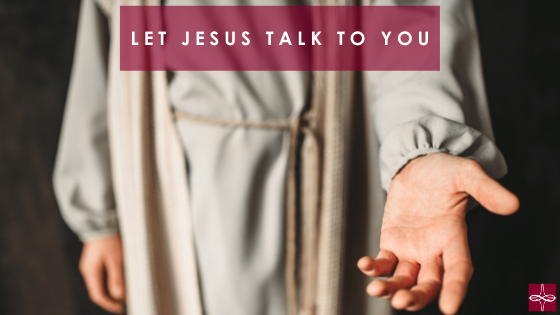
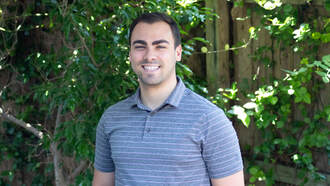

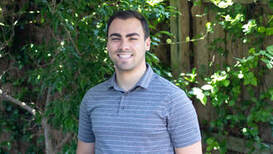
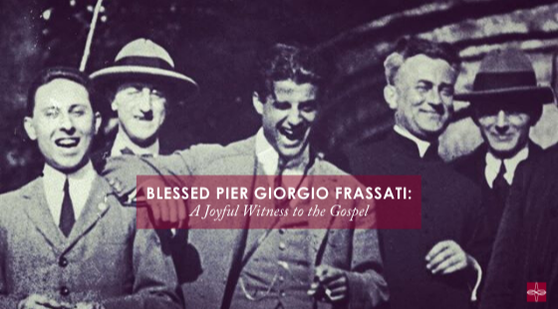

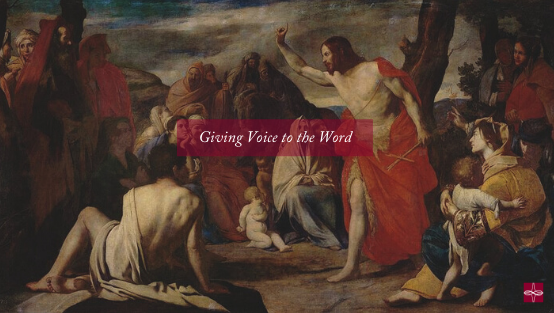

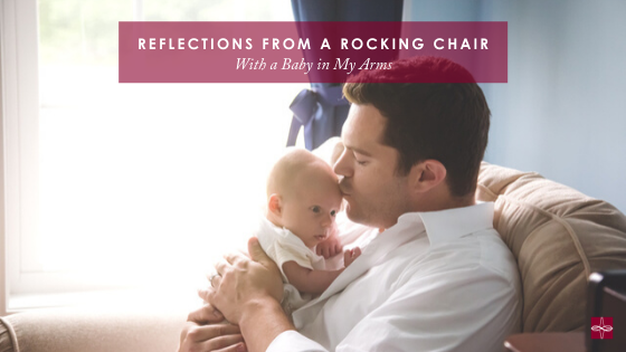
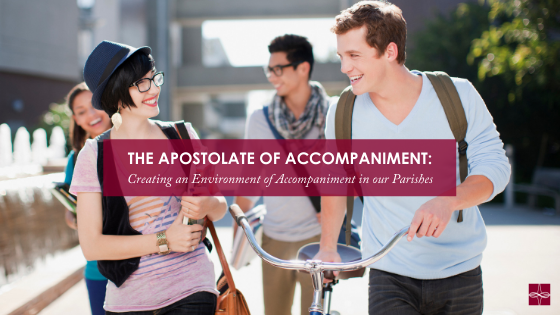
 RSS Feed
RSS Feed